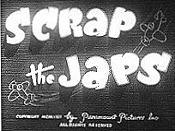It's Popeye the Sailor Man!
"Double-crossin' Ja-pansies!"
During the 1930s and 1940s, cartoons were serious business. While they have garnered the reputation over the years of being just for kids, cartoons were shown during evening shows down at the Bijou in between the newsreels and the main feature. Cartoons such as Popeye were directed at adults, not just children. Many servicemen had fond memories of watching Walt Disney's "Dumbo" before shipping out, for instance. Disney, incidentally, also produced cartoons to aid the war effort which many now would consider offensive. The Office of War Information coordinated these efforts and funded them - in fact, the money received helped to keep Walt Disney studios running after the financial disasters of Pinocchio and Fantasia.
The Popeye franchise was fertile ground for pro-American propaganda due to the nature of the character. Invariably, Popeye gets beat up by the "yeller" enemy - just like the US Navy fleet at Pearl Harbor - and then eats his spinach and comes roaring back - just like Admirals Halsey and Nimitz.
Those were different times, before the age of political correctness. Thus, stereotypes were rude and crude. The Japanese are portrayed as buck-toothed and wearing glasses. They also play on stereotypes of politeness masking evil intentions, conveying a sense of betrayal and deviousness about how the war began. The Japanese also were crafting anti-American cartoons about which I have posted previously, and long before American studios took up the theme, so this was not a one-way street. It is just the way it was.
Remembering these cartoons is important because it helps to better understand the time period. Posting or watching them does not mean that we subscribe to anything in them. In fact, viewing them now is a good lesson in how far we have come. However, these cartoons are likely to offend some viewers. Discretion is advised.
"You're a Sap" was a Paramount one-reeler in which Popeye defeats a Japanese battleship. Famous Studios had taken over the Popeye franchise from Fleischer Studios. Since there is no need for standard villains, and the interests to be protected are a given, Bluto and Olive Oyl are unnecessary and thus absent. The cartoon is based on a popular song of the era written by James Cavanaugh, John Redmond, and Nat Simon. The director is Dan Gordon, the animation is by Jim Tyer and George Germanetti, and Popeye is voiced by Jack Mercer. The release date, interestingly enough, was 7 August 1942 - the very day that US Marines waded ashore on Guadalcanal to begin the reconquest of the Pacific. Talk about fortuitous timing!
In "Scrap the Japanese," Popeye redeems himself by defeating some Japanese sailors. The Paramount one-reeler, also created by Famous Studios, is directed by Seymour Kneitel, with animation by Tom Johnson and Ben Solomon. Jack Mercer once again does the voices, not that Popeye has much to say. This short was released on 20 November 1942, shortly after the Naval Battle of Guadalcanal in which a Japanese battleship, the Kirishima, was sunk. This cartoon would have been especially enjoyable to audiences of the day due to the first news from the war that the tide really was turning in the Pacific.
2020






